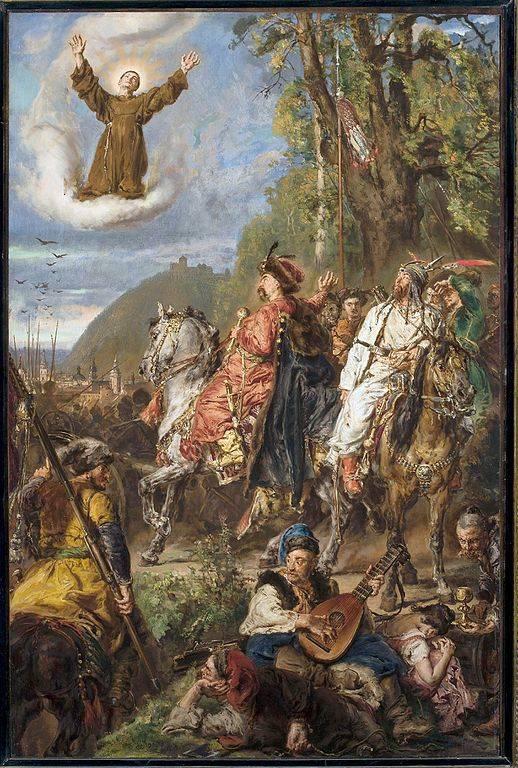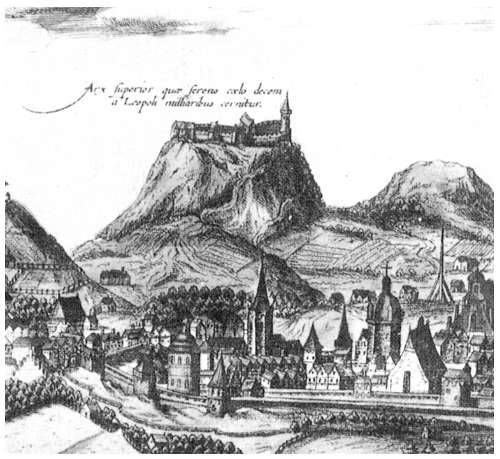How Khmelnitsky liberated Lviv
After a brilliant victory under the pilots of 11-13 in September of 1648, the scale of the people's liberation struggle of the Russian people against the Polish invaders widened. The Polish authorities in Volyn and Podolia were liquidated. The uprising intensified in Galicia. The uprising continued to spread in White Russia. There acted the detachments of Krivoshapki, Makhnenko, Garkusha and other national atamans. The Moldavian people actively joined the struggle. Shortly after the victory at Pilyavtsy, a regiment of Moldovans joined the peasant-Cossack army. Peasant uprisings began in Poland itself. The detachments of the rebel peasants even acted near Warsaw.
September 16 1648 after the capture of Starokonstantinov Cossack glad gathered. Deciding what to do next: continue the offensive and pursue the defeated enemy or stop at what has been accomplished? Khmelnitsky was a cunning and cautious politician. He knew that many foremen during the battles with the Poles scored a lot of good and now they thought how to make peace with Warsaw and live in clover. They wanted to go home and heal like lords. The simple people with the most violent atamans — Krivonos, Bohun, Charnotoy, Nechay and others, wanted to continue the struggle. In the end, glad I decided to go to the Poles. The army of Cossacks, Tatars, peasants, citizens headed by their chieftains and elders moved to Zbarazh, Zborov, Gliniany and Lviv.
When the forward detachments of the peasant-Cossack troops led by Maxim Krivonos approached Zbarazh, the Cossacks and the commoners, interrupting the Poles, opened the gates. Having captured the castle, the Cossacks captured many trophies. A Cossack detachment headed by the hetman Timothy Khmelnitsky’s son approached the town of Zborov. Residents went out to meet and presented rich gifts to Timothy. The city raised a rebellion before the rebels came here.
September 26 1648 Krivonos came under the walls of Leo, two days later the main forces, led by Khmelnitsky, arrived. The old Russian city was strategically located: from the east, there were two routes from Kiev - through Lutsk and Terebovl, from the south - the route from Moldova through Kolomyia and Galich, from the west - through Przemysl and Yaroslav, linking Lviv with Poland and Germany. The city had a stone wall with 17 towers. The city had two gates - Krakow and Galician, there were also two gates. Over the city stood the old High Castle.

Khmelnitsky and Tugay Bey near Lviv. Painting by Jan Matejko (1885)
Lviv was well known to Khmelnitsky, here passed the years of his youth. Many local townspeople helped him. Therefore, not wanting to ravage his native city and shed the blood of its inhabitants, the hetman, on the way to the city, sent a letter to the Lvov authorities with a friendly offer: “I come to you as the liberator of the Russian people; I come to the capital city of the land of the Chervono-Russian to save you from Lyashsky bondage ”.
However, the Khmelnitsky proposal was not accepted by the rich patricians of the city. Lviv was preparing for defense. Thousands of Poles who fled after the defeat near Pilyavtsy took refuge here. Even before Khmelnytsky for a short time, the defeated crowns headed by Jeremiah Vyshnevetsky and Nikolai Ostorog arrived in Lviv, but both magnates, despite promises to defend the city, did not stay there and left for Zamost. At the same time, Vishnevetsky imposed a contribution on citizens to protect Lviv and the fatherland. Citizens had to hand over all the money to the jewels. Huge funds were collected. Taking the treasury, Vishnevetsky left the city.
Khmelnitsky sent to storm the High Castle Krivonos. The fortress quickly fell, but Krivonos himself was seriously wounded, as a result of which he soon died (according to another version, he died of the plague). At that time, other Cossack detachments started skirmishes with the enemy on the ramparts near Goncharnaya Street, near the monastery of bare Carmelites, near the Galician gates, near the Bernardine monastery. During the siege of the city, many local residents joined the Khmelnitsky army. They told where the water pipeline runs, which was immediately blocked by the Cossacks.
Khmelnitsky did not want to go on a decisive assault, trying to persuade the magistrate to surrender. He needed a large ransom for the Tatars Tugaya Bey. He sent his ambassador to the city, offering the terms of delivery. The townspeople, impoverished after the indebtedness of Vishnevetsky, were afraid of slaughter, but did not want to pay much. Therefore, bargaining began. October 11 The 1648 of the year sent ambassadors to the hetman, among them was his old teacher, the priest Andrei Mokrsky. At one time this Jesuit tried to make a faithful Catholic out of Bogdan. Khmelnitsky repeated his demand for redemption, otherwise the assault and the ruin of the city. As a result, the delegation of the city agreed with the requirements of the hetman. A few days drove ransom. Having received about 100 thousand zlotys (Polish gold, then it was equal to 1 / 5 of the Russian ruble) and fabrics for 500 thousand, the Cossacks moved to Zamo. The siege of Lviv was lifted, and Khmelnitsky went to Zamozh. The Tatar horde, having received the ransom, for the most part returned to the steppe. In Lviv, “for the tranquility of the citizens”, hetman’s cousin Zakharia Khmelnitsky was left.

Fragment of engraving panorama of Lviv XVII century
The Siege of Zamoć
By the end of October 1648, the Khmelnitsky army approached Zamo. It was a strong fortress. In addition, unlike others, it managed to prepare for a long siege Vishnevetsky. In the fortress brought reserves of gunpowder, food. Khmelnitsky knew about it. I also knew that the peasant-Cossack army was not ready to besiege a strong fortress in the late autumn, not to mention the winter. The troops were tired of the campaign, there was a shortage of food and fodder, and illnesses began. It was necessary to withdraw troops to rest. Therefore, Khmelnitsky writes two letters: to Colonel Ludwig Weiger, the commandant of Zamost and the head of the German mercenaries who form the basis of the garrison of the fortress, with an invitation to join his army, and the nobility and the townspeople of the city with a proposal to begin negotiations. Khmelnitsky pointed out that the war was fought not by the Cossacks, but through the fault of Prince Vishnevetsky and Pan Konetspolsky, who dragged them into the war. Khmelnitsky proposed “not to fight with us, but to voluntarily make peace, as the Lvov citizens did” and promised to immediately retreat from the city with the whole army. However, those sitting behind strong walls and feeling safe, the besieged did not accept the offer of Khmelnitsky. Further attempts to reach an agreement also did not lead to success. The assault failed. Poles and Germans relatively easily repelled the onslaught of the rebels. After that, the Cossacks no longer attacked the fortress. Moreover, winter was approaching, cold rains were coming, and mass sickness began in the troops.
5 November 1648 of the year Khmelnitsky sent Andrey Mokrskyy to Warsaw (through him he conducted secret negotiations) and Zakharia Khmelnytskyy. Khmelnitsky decided to support the claim to the throne of Jan-Casimir. At this time in Poland there was a struggle for the royal throne. The main contenders were the brothers of the late King Jan-Casimir and Karl-Ferdinand. The younger of the brothers Yana-Casimir supported the so-called. "Peace" party led by the Crown Chancellor Ossolinsky. This party sought to make peace with Khmelnitsky, that gather strength and punish the rebels later, when unrest settles. In addition, the Poles feared that if the war continued Khmelnitsky would be able to conclude an alliance with Moscow. This grouping was supported by the Wielkopolska gentry, which did not depend on the magnates of Little Russia. The elder brother of King Charles - Ferdinand was supported by the “war party” led by Vishnevetsky, who insisted on the immediate continuation of the war with the insurgent “slaves”.
The Cossacks for the second time handed over their demands to the Diet. They consisted of 8 items and differed little from those that were presented in the summer of 1648. So, 12 thousand Cossacks were included in the register; Poland could not have its garrisons in the Zaporozhye army; Cossacks could go to sea whenever they wanted, and any number; all rebels receive forgiveness - “so that what happened is forgotten”; that the Cossacks were only under the authority of the king, and not under the authority of the coronate hetmans and had their own hetman elected from the Cossacks, etc. In general, the requirements took into account only the interests of the Cossacks. These conditions were beneficial to the future king, strengthening the royal power and weakening the power and wealth of the eastern magnates.
Meanwhile, Khmelnitsky received a letter from the besieged in Zamost. They agreed to pay 20 thousand zlotys if the Cossacks lifted the siege. 14 November was collected by the Rada, which decided, having received the proposed amount, to lift the siege and return to Kiev. In early December, Jan-Casimir becomes the king of Poland. Bogdan Khmelnitsky December 23 solemnly enters Kiev.
Information